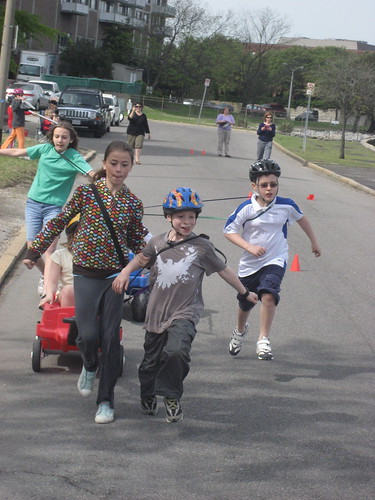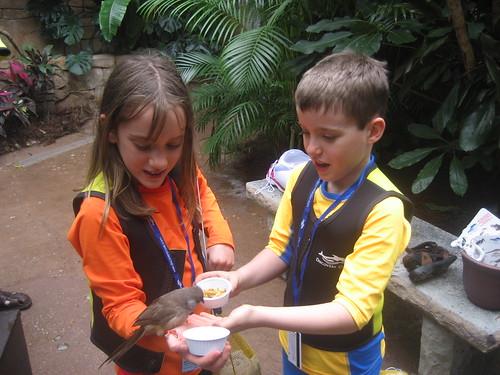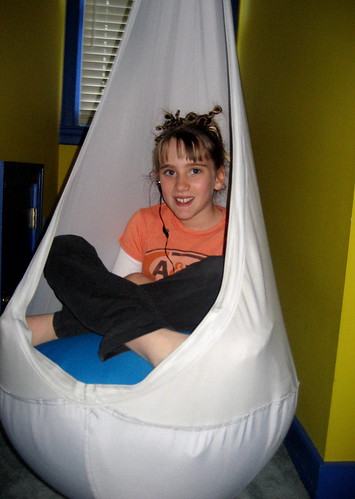
This is the time of year where I review all our curricula. I thought that, this year, I'd write up my reviews and post them on my blog.
We started off our homeschool journey using "First Language Lessons" by Jessie Wise. My kids and I are still trying to work out why people rave about it on TWTM boards as it bored us to tears. My children would beg me not to subject them to any more First Language Lessons torture. I finally gave it up as a bad job.
I then started thinking that teaching grammar formally was not necessary as I never learned formal grammar and I speak and write far better than average. However, as we progressed in our study of Latin using
Latin for Children, I realized that I was shortchanging our children by not formally teaching them grammar.
I looked at many grammar programs but discovered that my lack of formal grammar knowledge was a huge problem for me as almost all of them presupposed a basic knowledge on the part of the teacher. Since
Latin for Children was written to dovetail with
Shurley English, I decided to have a look at the program.
I'm the first to admit that my first look at the teacher's manual nearly had me in tears. It looked so complicated and difficult to master that I nearly put the book back onto the shelf. It was only the high recommendation that the program received from
Classical Academic Press, the publishers of "Latin for Children", and my dear friend Andrea, that gave me pause to re-look at the program.
A closer look made me realize that this program does not presuppose that the teacher has any grammar or writing knowledge. So, despite my misgivings, I bought the program.
It took me about 2 weeks to get into my stride with this program, but after that it was plain sailing. Now, we all love using
Shurley English.I love how it is a complete grammar and writing program. When you use
Shurley English you do not need to buy separate grammar and writing curricula.
One of the strengths of this program is that all the parts of speech are taught using jingles. You start each lesson by singing all the jingles you've learned to date. My kids just love singing the jingles and will often ask to sing them more than once.
"This little noun, floating around,
names a person, place, or thing.
With a nick-nack-paddy-whack,
these are English rules.
Isn't language fun and cool?"
An adjective modifies a noun or a pronoun.
An adjective asks, "What kind? Which one? How many?"
To find an adjective: Go, Ask, Get.
Where do I go? To a noun or pronoun.
What do I ask? What kind? Which one? How many?
What do I get? An ADJECTIVE! (clap) (clap)
That's What!
I find my kids singing these jingles under their breathe when they are unsure of how to to work out the parts of speech in a particular sentence.
I have a very math driven son who really struggled with First Language Lessons. Ben needs to be able to reduce everything to a pattern or system.
Shurley English does just that. You are given a "question and answer flow" to use for every sentence that you mark up. It makes working out the various parts of speech so much easier for the children (and mom).
Ben, in particular, loves that he can now see the pattern and he happily marks up his sentences. In fact, my kids love doing this so much that they do not like that they only get three sentences a day from Shurley to mark up. I have to make up more for them every day.
Another huge benefit is that the program is structured to give immediate feedback to the children as they work through a lesson. The children identify the parts of speech in a sentence and then I immediately go through it with them. This allows for immediate correction of mistakes and hopefully they learn not to make this mistake the next time.
I've transferred this concept to our math lessons. We mark each math problem as they do it. They love the immediate feedback and I've found that their skills progress at a rate of knots compared to when they did the same number of problems but only had them checked once they'd done them all. By giving feedback immediately after each problem, the children never repeat the same mistake over and over again. When they repeat the same mistake over and over, they learn the mistake and then you have to spend much more time rewiring their brains as they learn the correction.
Both my kids love how
Shurley teaches writing. They like that they are taught a basic skeleton for each form of writing they do. The
Shurley method appeals to both my math driven son and my verbal, arty daughter. They both appreciate being able to see a system and then to make it their own by adding their own creative touches. I was pleasantly surprised to see how quickly my children's writing improved once we started using
Shurley English. Every week I have my children write two or three paragraphs answering questions based on the previous week's history lessons. I was ecstatic to see how much my children's writing of these paragraphs improved once they did Shurley's lessons on how to write paragraphs. I'm always happy to see skill transference.
I'm in love with their editing and revising charts for writing. Nothing is left to chance. The children are taught, step-by-step, how to revise and edit their writing.
I initially thought that the exercise Shurley gives the children in sentence construction was pretty lame. That only lasted until I saw how much my children enjoyed it. Yesterday I had children jumping up and down with excitement because I wrote one of these up on the board. It's difficult to explain what you do, but I'll give it a bash.
You write the parts of speech labels for a sentence on the board. For example, A Adj SN A Vt Adv V P PPA OP. The children then write up a sentence that follows that format. For this sentence it could be, "The beautiful girl threw the ball to her dog."
That's not the fun part though. Once this sentence is written the children have to change words using one antonym, one word change and one or more synonyms. So, the sentence could turn into, "The rotund boy tossed a fish to his feline." My kids do one serious sentence and one silly sentence each time. I find that it is a great way to bring humor into our school day.
Little do the children realize that they are learning how to revise their writing when they practice this little exercise.
I've heard homeschoolers say that they don't use Shurley because it is too scripted. I like the scripts because it leaves nothing to chance. I know exactly what to teach and how to teach it to my children. That said, I will often read the lesson and then use my own words to teach it. If you are a script hater, please do not let this put you off this program. The benefits to you and your child far outweigh this minor irritation. See research on the benefits of using
Shurley English.
I have no doubt that children who are taught English using Shurley English will turn into strong readers and writers. Schools in Athens, GA are finding that Shurley English is causing a dramatic improvement in language arts scores. Here's an article on this
here.
Mrs. Shurley is a great supporter of homeschooling and a promoter of writing in the young. Thank you Mrs. Shurley for sponsoring the
Book Arts Bash, a writing competition that celebrates our homeschool writers.


















 Marc and I often talk about how we'd dearly love to both be at home all the time with the children. Unfortunately Marc has to spend his days at the local hospital. Pathology is not a field that allows for working from home and fitting work into your life schedule.
Marc and I often talk about how we'd dearly love to both be at home all the time with the children. Unfortunately Marc has to spend his days at the local hospital. Pathology is not a field that allows for working from home and fitting work into your life schedule.











